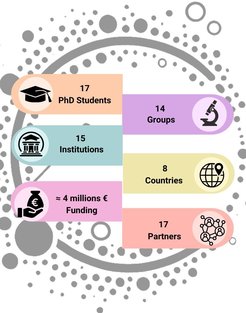ComeInCell Launches:
A European Doctoral Network to Train the Next Generation of Cell Scientists
Supported by the EU’s Marie Skłodowska-Curie Actions and the UK Guarantee Scheme, the 'Condensates at Membrane Scaffolds – Integrated Systems as Synthetic Cell Compartments’ doctoral network seeks 17 PhD candidates. This international and interdisciplinary program aims to train future biomedical and biotechnology researchers to explore cellular mechanisms with advanced synthetic models.
A cell is the most basic unit of life, or a small building block capable of performing essential functions like reproduction, nutrient conversion into metabolic energy, and growth. But "basic" does not mean simple. Cells are intricate assemblies of lipids, proteins, nucleic acids, carbohydrates, and water, organized into dynamic structures of membranes and specialized organelles. And while small, cells are far from uninfluential: they constantly adapt to external stimuli, and when they malfunction, the consequences can be profound—leading to uncontrolled growth, as in cancer, or to premature cell death, as in neurodegenerative diseases. Today, a new doctoral network funded by the European Union’s Marie Skłodowska-Curie Actions and cofounded by the UK Guarantee Scheme launches with an ambitious goal: training the next generation of biomedical and biotechnology researchers who will uncover cellular mechanisms through cutting-edge synthetic replicas.

The full title of the project is "Condensates at Membrane Scaffolds - Integrated Systems as Synthetic Cell Compartments," but, like many EU-funded initiatives, it goes by a much friendlier acronym: "ComeInCell." The network brings together 14 Principal Investigators and 17 institutions across 8 countries focused on creating synthetic models to mimic natural cell behavior. Drawing on expertise in biophysics, nanotechnology, biochemistry, and bioengineering, researchers will design efficient, resource-conscious synthetic models that simulate biological processes. As the name ComeInCell suggests, cells will be studied as integrated systems, with each component constantly interacting and reshaping the others —such as membranes that provide internal scaffolding and membraneless droplets called biomolecular condensates. From London to Tel Aviv, the network strives for a significant impact not only on fundamental science but also on medical applications. A better grasp of cellular mechanisms helps trace the roots of numerous diseases. Furthermore, synthetic cells hold great promise as non-invasive drug carriers and innovative and sustainable testing tools for tailored therapeutic applications.
To achieve these scientific goals, ComeInCell is equally committed to recruiting 17 graduate students and supporting their scientific and professional development with well-rounded training. True to their namesake, Marie Curie projects promote international mobility and collaboration, integrating students into an interdisciplinary network. PhD candidates will participate in annual retreats and gain hands-on experience across 2-3 different labs, building connections with peers and mentors. Interdisciplinary workshops and lectures will equip students with diverse skill sets for synthetic cell development— with an emphasis on sustainable and cost-effective methods. In ComeInCell, academia and industry join forces to provide long-term transferable skills. Alongside academic labs and seminars, students will gain practical experience at partner companies in biotechnology, software development, and analytical instrumentation. With a strong focus on research dissemination, they will even have the opportunity to work with the editorial teams of two top-tier scientific journals.
With ComeInCell’s scientific and educational journey now officially underway, interested students have an exciting opportunity to explore and expand the frontiers of cell research.









